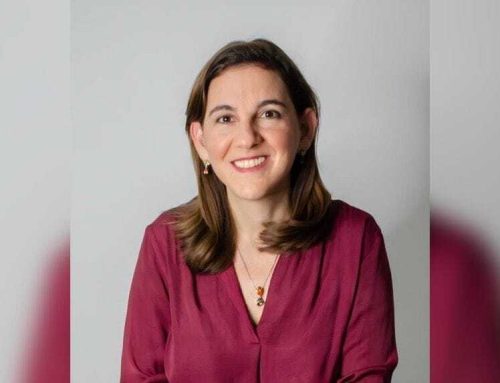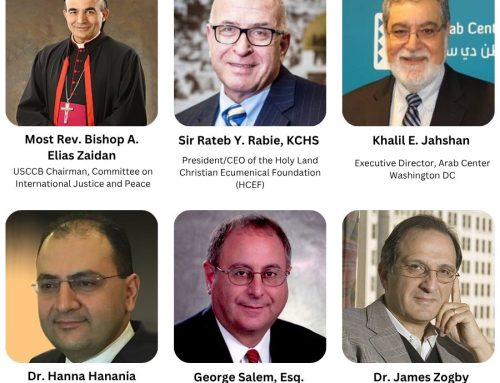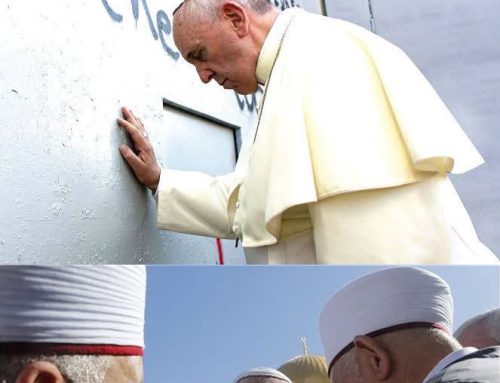Saliba Sarsar, Ph.D.
Chair of the HCEF Research and Publication Committee and Professor of Political Science at Monmouth University.
In addition to the diplomatic, political, and strategic components of his first international trip, U.S. President Donald Trump is seeing the light by highlighting the faith or religious dimension. Stops include Saudi Arabia, the location of Mecca and Medina, the two holiest cities in Islam; Jerusalem, the city holy to Christians, Muslims, and Jews; and Bethlehem, the site of the Church of the Nativity, before proceeding to visit the Vatican, the seat of the Catholic Church or Holy See.
What President Trump and his advisors recognize is that while religion by itself cannot explain the daily routine of every aspect of Middle East life, Middle East life cannot be fully understood without considering matters of faith. Their main challenge is not only to create a coalition against terrorism and radicalism, but also to transform what they learn into positive steps for building bridges between national communities and for working with others, the religious among them, to promote hope, peace, and reconciliation.
The task will not be easy as the Middle East is home to many conflicts and contradictions. While many of these are, in themselves, political, in the birthplace of the three monotheistic faiths of Judaism, Christianity, and Islam, they usually become stirred by religious visions and divisions, often leading to violence. That is why politics, in the driver’s seat, must always address the core values of the passengers, which are heavily infused by various religious beliefs and practices.
Middle Easterners have differences, but most share much in common, including religious heritage under one God; religious values such as compassion; religious obligations such as prayer, almsgiving, fasting, and pilgrimage; and religious days of rest. Moreover, most Middle Easterners wish to be secure and prosper in dignity and peace, while very few among them wish to disempower the rest and aggrandize themselves at the expense of others, often using religious injunctions to justify their acts. Witness the criminal activities of ISIS.
Governments also have their issues. In Saudi Arabia, the Qur’an and the Sunnah (Prophet Muhammad’s saying and deeds) are the Constitution. Almost all citizens are Muslim, and Muslim teachings are based on principles of the conservative and strict interpretation of the Salafi (venerable Caliphs or Muslim leaders who succeeded Muhammad) School of the Sunni branch of Islam. Saudi Arabia has often used its financial muscle to ensure its leadership role of Sunni Islam and to minimize as best it can the encroachment of Iran’s Shi‘a power across the Middle East and beyond.
In Israel, life becomes transformed as the Sabbath is observed by religious Jews. (Christians observe their day of rest on Sunday and Muslims on Friday.) Whether non-observant Jews, Christians, and Muslims agree or not, they are impacted as public transportation comes to a halt, shops close down, and public services are curtailed. Israeli Jews have been undergoing “a culture war” over their political-religious divide.
In addition, the claims and counterclaims over religious rights and property between Israelis and Palestinians more often than not raise tensions between them. Non-Jewish worshippers (i.e., Muslims and Christian Palestinians) cannot reach Jerusalem from the West Bank and the Gaza Strip for religious observances without permits from the Israeli military authority, which are not easily secured. The delays in the Israeli-Palestinian peace process may be partially attributed to the lack of political will of politicians who are beholden to, weak in the face of, or afraid to antagonize religious fundamentalists in both Israel and Palestine.
In Palestine, religion plays an essential role in the lives and culture of both the Muslim majority and the Christian minority. While the state embodies or invokes certain religious values, it has remained neutral on religious matters. The Palestinian Authority government and most Palestinians, however, remain challenged by the Israeli occupation on one hand and Muslim fundamentalism, as represented by Hamas and Islamic Jihad, especially in the Gaza Strip, on the other.
President Trump’s visit to the Middle East will surely moderate his views on Islam, introduce him to intricacies of the religious differences and similarities in the Holy Land, and provide him the opportunity to see first-hand some of the complexities in Palestinian-Israeli relations.
What is important for President Trump and others to understand is that any peace negotiations or rapprochement between national communities must be based on non-monolithic ways of thinking and doing. These ordinarily do not pigeonhole realities or artificially split politics from religion.
Advancing multiple perspectives and interests, including those related to faith, will make room for the views and actions of the rulers and the ruled, the political and the religious, and all others in between. Increased knowledge and historical depth will enable the incorporation of balance, empathy, and nuance, which are among the prerequisites for arriving at and living peace.






